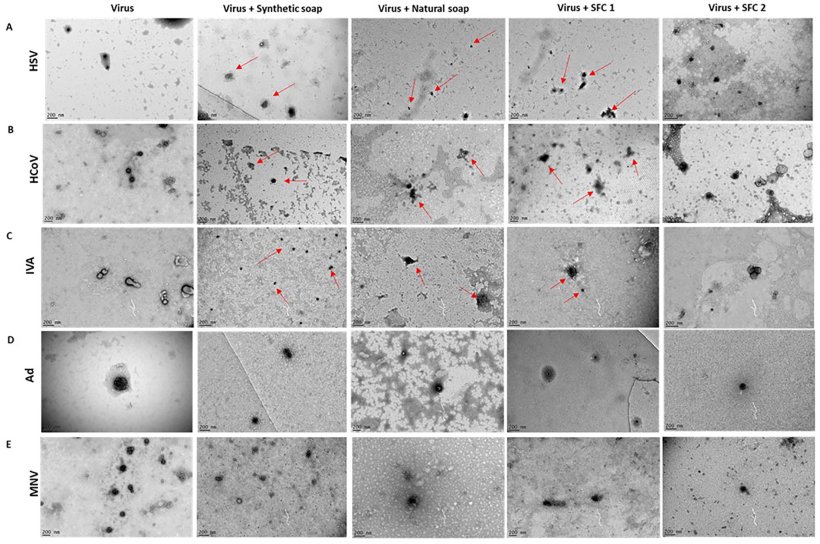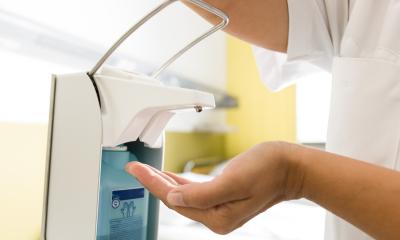Image source: Adobe Stock/Alexander Raths
News • Study on gentle cleansers
Virus-killing properties of soaps: No need for the 'hard stuff'
Gentle cleansers are just as effective in killing viruses – including coronavirus – as harsh soaps, according to a new study from scientists at the University of Sheffield.
Health care professionals often substitute harsh soaps or alcohol-based hand sanitisers with skin-friendly cleansers in order to treat or prevent irritant contact dermatitis - a common skin disease which causes red and swollen skin with a dry and damaged surface. During the Covid-19 pandemic, incidence and severity of the disease amongst healthcare professionals increased from 20% to 80%.
Despite the widespread use of gentle cleansing products for handwashing, there has been limited evidence to show the antiviral efficacy of the products to prevent the spread of viruses such as human coronavirus, herpes simplex virus, norovirus and influenza.
Scientists from the University of Sheffield’s Sheffield Dermatology Research (SDR) group tested multiple handwash products as part of the study. These included antibacterial soap, natural soap, foam cleansers and bath wash products, with the team investigating their ability to kill both enveloped viruses; such as human coronavirus and influenza, which have an additional layer of structural protection; compared to non-enveloped viruses, such as norovirus and adenovirus. The findings, published in the journal Frontiers Virology, show gentle cleansers were effective in killing enveloped viruses, but non-enveloped viruses displayed resistance against skin-friendly cleansers, as well as harsh soaps.

Image source: Winder et al., Frontiers in Virology 2023 (CC BY 4.0)
Substituting harsh soaps with milder wash products [...] is effective in fighting against enveloped viruses [...], which is very encouraging - especially for those in jobs in which irritant contact dermatitis is an occupational hazard
Munitta Muthana
Lead author of the study, Dr Munitta Muthana from the University of Sheffield’s Department of Oncology and Metabolism, said: “Washing our hands with soap and warm water for 20 seconds was a fundamental message advocated in the UK to help stop the spread of Covid-19. But for healthcare professionals, who can wash their hands as many as 100 times during a 12 hour shift, this may cause unintended adverse effects. Not only does irritant contact dermatitis cause the skin to become inflamed, blister and crack, which increases transmission of bacteria and viruses, it can also lead to less compliance with personal protective equipment (PPE) and inadequate hand washing for fear of making symptoms worse. The disease can also significantly impact workplace productivity.
“For the first time, our study has shown substituting harsh soaps with milder wash products such as gentle cleansers is effective in fighting against enveloped viruses, including human coronavirus, which is very encouraging - especially for those in jobs in which irritant contact dermatitis is an occupational hazard. We also found that using additional agents such as moisturisers to help protect the skin didn’t prevent the products' antiviral activity, which means we don’t have to use very harsh products on our skin in order to kill viruses.”
Norovirus can spread very easily - it takes just 18 norovirus particles to infect another person, as opposed to 1,000 coronavirus particles needed to spread the infection
Natalie Winder
Importantly, the study also found non-enveloped viruses demonstrated greater resistance across all types of hand washing products tested, including harsh chemical substances and milder solutions. Norovirus - known as the winter vomiting bug - was the most resilient.
First author of the study, Natalie Winder, PhD Researcher at the University of Sheffield’s Department of Oncology and Metabolism, said: “Even when we increased the exposure of norovirus to the handwashing products from 20 seconds to one minute, the virus wasn’t disrupted. Bleach was the only agent which affected the virus - however bleach-based hand washes are not a feasible option due to its corrosivity, which would be extremely harmful to the skin. Norovirus can spread very easily - it takes just 18 norovirus particles to infect another person, as opposed to 1,000 coronavirus particles needed to spread the infection. Our findings show that although good hand hygiene practices are important to preventing the spread of many viruses, they are insufficient at controlling the norovirus.
“Measures such as isolation and disinfecting surfaces with bleach are more effective in preventing the spread of the norovirus infection and more research needs to be done to see whether heavily diluted bleach-based hand washes, which are safe to use on the skin, can be produced.”
The study was conducted by the University of Sheffield and funded by CeraVe.
Source: University of Sheffield
17.06.2023








